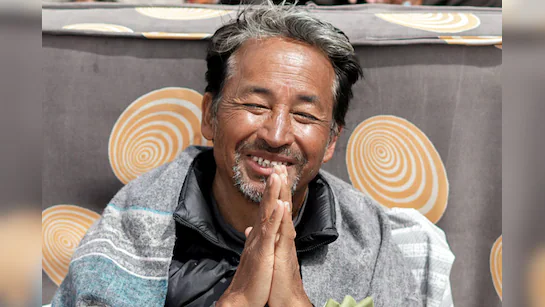A Protest, A Crackdown, A Question of Democracy
By: Javid Amin | 25 September 2025
In the wake of violent protests in Leh demanding statehood and constitutional safeguards for Ladakh, the Indian government has revoked the Foreign Contribution Regulation Act (FCRA) licence of Sonam Wangchuk’s NGO, the Students Educational and Cultural Movement of Ladakh (SECMOL). The move has sparked national debate over civil liberties, dissent, and the shrinking space for activism in India’s border regions.
Wangchuk, widely regarded as the face of Ladakh’s statehood movement, has denied any role in inciting violence, calling the government’s action a “scapegoat tactic” aimed at silencing legitimate demands.
What Sparked the Ladakh Protests?
On September 24, 2025, Leh witnessed one of its most violent uprisings in recent history. What began as a peaceful hunger strike led by Wangchuk and other activists escalated into clashes, arson, and police firing, resulting in four deaths and over 70 injuries, including 40 police personnel.
Protest Demands:
- Statehood for Ladakh
- Inclusion under the Sixth Schedule for tribal protection
- Restoration of democratic institutions, including a Public Service Commission
- Safeguards for land, jobs, and cultural identity
The protests were organized by the Apex Body Leh and the Kargil Democratic Alliance, with Wangchuk playing a prominent role in mobilizing youth and civil society.
Government’s Response—Revoking SECMOL’s FCRA Licence
Just 24 hours after the violence, the Ministry of Home Affairs (MHA) cancelled SECMOL’s foreign funding licence, citing multiple violations of the FCRA.
Alleged Violations:
- ₹3.5 lakh deposited in the FCRA account from the sale of a bus—claimed to be in cash, violating Section 17
- ₹4.93 lakh donation from a Swedish donor for youth awareness—deemed “against national interest”
- ₹54,600 in local contributions wrongly deposited in the FCRA account
- Return of ₹19,600 foreign donation during COVID lockdown—flagged as “undesirable” under the Act
The government claimed Wangchuk’s “provocative speeches” incited the mob that attacked BJP offices and election headquarters in Leh.
Wangchuk’s Rebuttal—“I’m Ready for Jail, But Don’t Muzzle the Truth”
In a statement to PTI, Wangchuk dismissed the allegations, saying:
“To say it was instigated by me, or sometimes by Congress, is to find a scapegoat rather than addressing the core of the problem. They may be clever in making somebody else a scapegoat, but they are not wise.”
He also warned that the government may invoke the Public Safety Act (PSA) to detain him for two years, adding:
“I am ready… but a Sonam Wangchuk in jail may cause them more problems than a free Sonam Wangchuk.”
The Role of SECMOL—More Than Just an NGO
Founded in 1988, SECMOL has been a beacon of alternative education and climate innovation in Ladakh. From solar-powered campuses to ice stupas, Wangchuk’s work has earned global acclaim.
SECMOL’s Contributions:
- Passive solar architecture for Himalayan winters
- Youth empowerment programs on sustainability and civic engagement
- International collaborations with UN, Swiss, and Italian institutions
The cancellation of its FCRA licence effectively bars SECMOL from receiving foreign contributions, threatening its ongoing projects and partnerships.
Civil Society Under Pressure—A Pattern Emerges
Wangchuk’s case is not isolated. In recent years, several NGOs have faced funding restrictions, legal scrutiny, and operational hurdles, especially those involved in human rights, environmental advocacy, or minority issues.
Recent Crackdowns:
- Amnesty International India
- Greenpeace India
- Oxfam India
- Centre for Policy Research
Critics argue that the FCRA is being weaponized to curb dissent and delegitimize grassroots movements.
Political Reactions—Voices of Solidarity and Concern
Farooq Abdullah (NC President):
“Ladakh is a border state. China is lurking. The government must hold talks and resolve this quickly.”
Karan Singh (Veteran Congress Leader):
“The youth in Ladakh are resentful. Their employment opportunities are disappearing. Inclusion in the Sixth Schedule seems reasonable.”
These statements reflect growing concern over regional alienation, democratic erosion, and national security implications.
Legal and Ethical Questions Around FCRA Enforcement
The FCRA was designed to regulate foreign donations and ensure transparency. However, its interpretation and enforcement have raised questions:
- Can donations for climate awareness be deemed “against national interest”?
- Is returning unused foreign money during a pandemic a punishable offense?
- Should procedural errors result in complete cancellation of funding?
Legal experts argue that proportionality and intent must guide enforcement—not political convenience.
The Bigger Picture—Ladakh’s Identity Crisis
Since its bifurcation from Jammu & Kashmir in 2019, Ladakh has struggled with:
- Loss of legislative autonomy
- Absence of tribal protections
- Centralized governance
- Youth disenfranchisement
The protests and the crackdown on Wangchuk reflect a deepening identity crisis, where development without dialogue is breeding unrest.
What Needs to Change—Policy Recommendations
For the Government:
- Initiate inclusive dialogue with Ladakh stakeholders
- Reassess FCRA enforcement with transparency and fairness
- Restore democratic institutions and local governance
For Civil Society:
- Build legal resilience and compliance frameworks
- Strengthen domestic fundraising to reduce dependency
- Amplify regional voices through storytelling and advocacy
Final Thoughts—Scapegoats Don’t Solve Crises
Sonam Wangchuk’s case is a litmus test for India’s democratic maturity. Blaming activists for unrest may offer short-term deflection, but it erodes trust, silences reform, and deepens alienation.
As Wangchuk said, “This will lead us nowhere.” The real solution lies in listening, engaging, and reforming—not punishing those who dare to speak.



